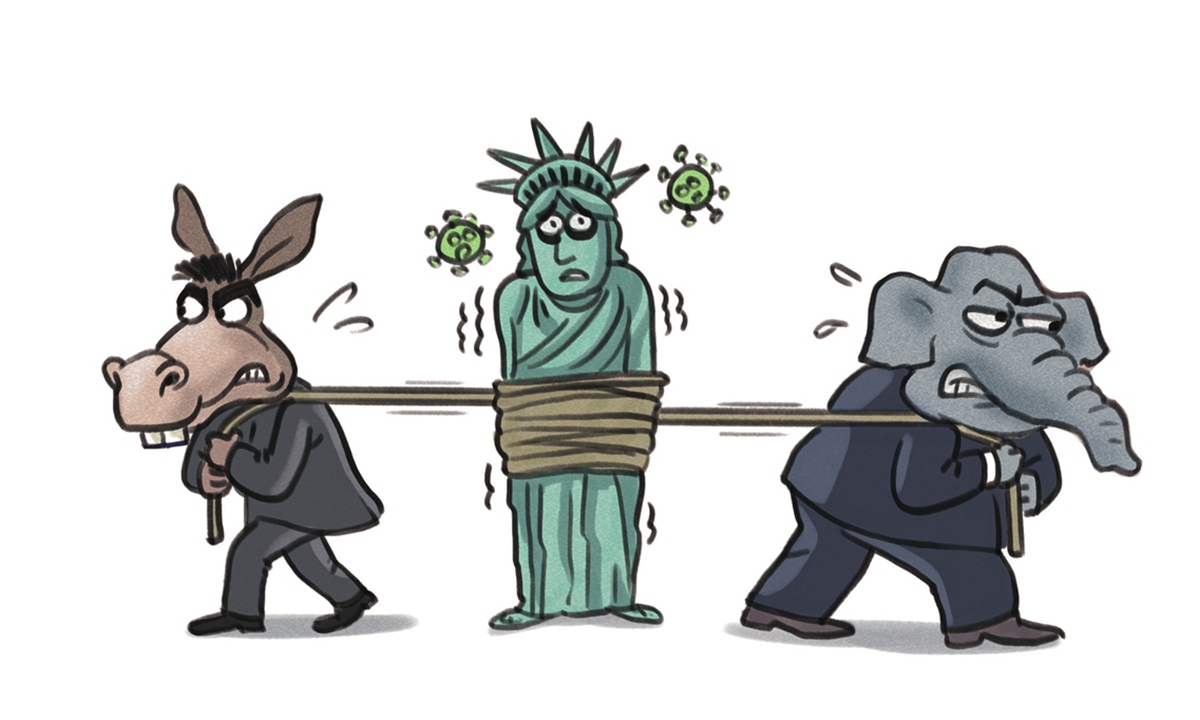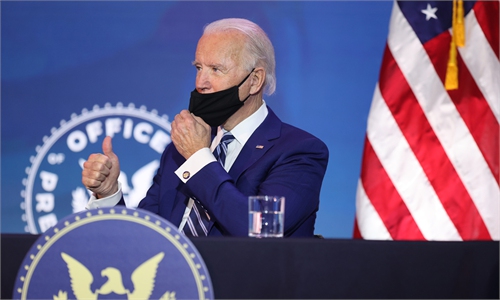Can ‘melting pot’ unite a polarized US?

Division in the US Illustration: Liu Rui/GT
The word most spoken by the new US President Joe Biden after his election victory is probably "Unity." This reminds me of the post-"9/11" era in the US.I was in New York at the time and saw many slogans on the streets with the word "United" on September 12, 2001. One of the placards read: "United, we stand up."
The word "United" reminds us of the US as a "united nation."
The 9/11 incident was the first time that the US was "invaded" by a foreign enemy. The Americans believed then that they must unite to fight against alien attacks.
The Americans regarded that attack as a full assault on American civilization and beliefs. Overnight, the American flag was planted all over New York, and Professor Samuel P. Huntington's famous book, The Clash of Civilizations and the Remaking of World Order became a bestseller.
Now, the Americans are once again called upon by their president to: Unite!
Americans are convinced that as long as they unite and regain values that have created the American "melting pot," the country will reorganize from the chaos and restore vitality.
Ironically, this time they are not dealing with foreign enemies, but internal strife. The cause of the civil unrest stems from a sharp division of values.
The problem that the US faces is not a contest or race between two different values.
The same values that gave birth to the US have been divided by the American people into two halves. Now there seems to be a strong pull to political extreme directions, with half of Americans opposing the other half.
Yet the latest presidential contest was between two aged white men in their 70s, hardly a representation of America's true diversity.
It was a showdown between 74 million voters who supported Donald Trump and more than 80 million others who supported Biden. It is the split between the middle class and was a majority going against a majority - a divided nation.
Homosexuality, abortion, medical insurance, minimum wage, immigration and equal rights for women are just a few examples.
These issues are not unique to today's contentious America, but in this last election, they were all related to the bottom line of American values and became significant talking points related to the future of the nation.
One side said that the essence of America lies in democracy and compromise; the other emphasized that, "Jesus is my savior and Trump is my president."
One group said that the essence of America is openness and diversity. The other group firmly believes that white people's civilization is being smashed.
One group opposes the increase of universal health care, saying that it can only raise lazy people. The other faction believes that the US welfare system has collapsed and must be repaired.
Elements of these values correspond to ideals that fuel the great American "melting pot." It is this "pot" that shapes today's America.
These basic ideas have sometimes contradicted each other due to different policy priorities made by various presidents and congresses.
But today these contradictions are striking and at fever pitch, as we saw with the failed insurrection riot at the US Capitol. Those guys fear terribly that the bottom line of white supremacy has been completely broken.
We also felt the fear in some elites who were so angry at the attack on Congress. They seem to have seen the collapse of American democracy that almost happened that day. How can such deep divisions and oppositional politics be bridged?
From 9/11 to today, the US has experienced a fierce evolution from invasion by foreign enemies to internal divisions.
Today's globalization emerged under the world order that the US was trying to shape after World War II, but it has created unprecedented challenges and tests to the "melting pot" of the US.
The crux of the question is: Can it still bring everyone together with such seemingly permanent polarization?
The author is a senior editor with People's Daily, and currently a senior fellow with the Chongyang Institute for Financial Studies at Renmin University of China. dinggang@globaltimes.com.cn. Follow him on Twitter @dinggangchina


